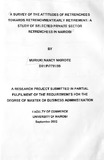| dc.description.abstract | The psychological and behavioral effects of retrenchment/"early retirement" on
the affected employees has received scanty attention in the Kenyan context.
This research project reports a study of retrenches from the private sector in
Nairobi and the handling of retrenchment by organizations. The first objective
was to determine the attitudes of retrenches towards retrenchment
programmes and to find out whether or not there were any organizational
interventions programmes. Further the study sought to find out whether
intervention programmes had any significant effect on the attitudes of the
victims towards retrenchment programmes or not. The population of the study
comprised of all those retrenched from the private sector and living in Nairobi.
The sample consisted of forty retrenched persons from different organizations.
Data was collected by the use of a questionnaire which was designed to
measure the three dimensions of attitude comprising cognitive (knowledge of
retrenchment especially prior to retrenchment), affective (liking or disliking of
retrenchment), co-native (the reaction of the retrenches towards retrenchment).
Descriptive statistic was used to summarize the data while Chi-square statistic
using the Statistical Package for Social Sciences (SPSS) was used to test the
relationship between the retrenches' attitude towards retrenchment and the
existence or non-existence of organizational intervention programmes. The
results indicate that most retrenches view retrenchment programmes very
negatively and that the handling of the process by the employer is very
important to the victim's attitude and psychological comfort. Further, the
results indicate that there is a relationship between the retrenches' attitude
towards retrenchment and 'existence or non-existence of intervention
programmes. Specifically, advance notification, counseling, extended benefits
and retraining programmes were found to be significant factors.
I recommend that employers plan their workforce properly to avoid sudden job
losses and that active employees be prepared in advance for lay offs. It is
suggested that further research looks into the future of the employment
contract particularly the effects of information technology and E-commerce. | en |

